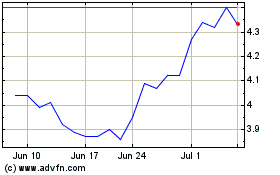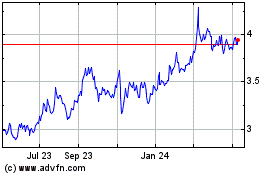Japan's Largest Bank Threatens to Quit Government-Bond Role
June 08 2016 - 9:20AM
Dow Jones News
TOKYO—Japan's biggest bank delivered a fresh message of
frustration over negative interest rates to the Bank of Japan on
Wednesday, saying it might stop acting as a primary dealer of
Japanese government bonds.
Bank of Tokyo-Mitsubishi UFJ, the banking unit of Mitsubishi UFJ
Financial Group Inc., would become the first Japanese bank to
relinquish that role in the JGB market, which comes with privileges
and obligations.
The possible action underscores Japanese lenders' rising
tensions with the central bank over negative rates. The banks say
negative rates haven't created more demand for loans but have hit
their stock prices and threaten to cut their profits.
Banks are growing concerned that the BOJ, which in February set
a rate of minus 0.1% on some commercial-bank reserves, might push
the rate even lower. Banking executives, who say they suspect the
BOJ might be willing to cut the rate to as low as minus 0.3%, are
pressing central bank officials not to do so.
MUFG President Nobuyuki Hirano in April became the first top
Japanese banking executive to publicly criticize the BOJ's
negative-rate policy, saying it had actually caused households and
businesses to rein in spending by creating a sense of uncertainty
about the future.
"For the banking industry, the consequences, at least in the
short term, are clearly negative," Mr. Hirano said in a speech in
Tokyo.
A person close to the BOJ said Wednesday that a withdrawal by
BTMU as a primary dealer would be "rather welcome news for us"
because it would mean the bank is diversifying into riskier assets.
It is unusual for investors such as banks to serve as dealers in
other countries, including the U.S., where securities firms
generally occupy that role, the person said.
BTMU's threatened action wouldn't have a big impact on the
market in the short term. There are 22 banks and brokerages listed
as primary dealers, a role that comes with entitlements such as
meetings with Ministry of Finance officials.
Such a move might help limit the bank's exposure to JGBs if the
BOJ's extraordinary monetary policies lead to market instability.
Primary dealers are required to bid on at least 4% of each planned
JGB issuance, a responsibility that banks may find increasingly
unattractive as the BOJ's quantitative easing enters its third full
year.
The BOJ has been buying ¥ 80 trillion ($747 billion) of JGBs
annually, roughly equivalent to all new issuance, and now owns
about third of the outstanding market. Its JGB purchases, and the
introduction of negative rates, are meant to drive interest rates
lower across the yield curve, creating demand for loans and pushing
investors into higher-yielding "risk assets" as part of efforts to
fuel economic growth.
The lower yields also help the Japanese government, which is
relying on the central bank to absorb enough bonds to finance its
deficits. The government is likely to propose an economic-stimulus
plan valued at about ¥ 10 trillion ($93 billion) this fall, an aide
to Prime Minister Shinzo Abe said Wednesday.
Since the central bank introduced negative rates, the yields on
all JGBs with maturities of up to 10 years have been negative. Some
analysts say the central bank's JGB purchases are distorting the
market, and a withdrawal could result in a painful JGB selloff.
The benchmark 10-year JGB yield was little changed Wednesday at
minus 0.120%.
"While the short-term impact [of a withdrawal by BTMU] is likely
to be limited, the BOJ's overly easy monetary policy could lead to
the instability in the JGB market in the long term," Deutsche
Securities strategist Makoto Yamashita said.
In recent years, Japanese banks have aggressively shed exposure
to JGBs. The top three have cut their holdings by about 20% over
the past year. BTMU now has ¥ 22 trillion, while the banking units
of Mizuho Financial Group Inc. and Sumitomo Mitsui Financial Group
Inc. hold about ¥ 16 trillion and ¥ 10 trillion, respectively.
Lenders are reluctant to hold negative-yielding bonds and are
seeking higher yields elsewhere.
Mizuho and SMFG said they weren't considering relinquishing
their status as primary dealers. Two affiliates of BTMU, Mitsubishi
UFJ Morgan Stanley Securities and Morgan Stanley MUFG Securities,
said they would remain primary dealers so their group could
continue selling JGBs to investors.
Takashi Nakamichi and Megumi Fujikawa contributed to this
article.
Write to Atsuko Fukase at atsuko.fukase@wsj.com
(END) Dow Jones Newswires
June 08, 2016 09:05 ET (13:05 GMT)
Copyright (c) 2016 Dow Jones & Company, Inc.
Mizuho Financial (NYSE:MFG)
Historical Stock Chart
From Mar 2024 to Apr 2024

Mizuho Financial (NYSE:MFG)
Historical Stock Chart
From Apr 2023 to Apr 2024
